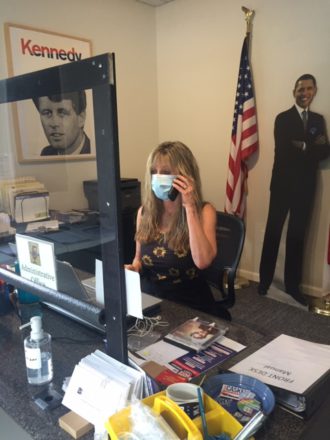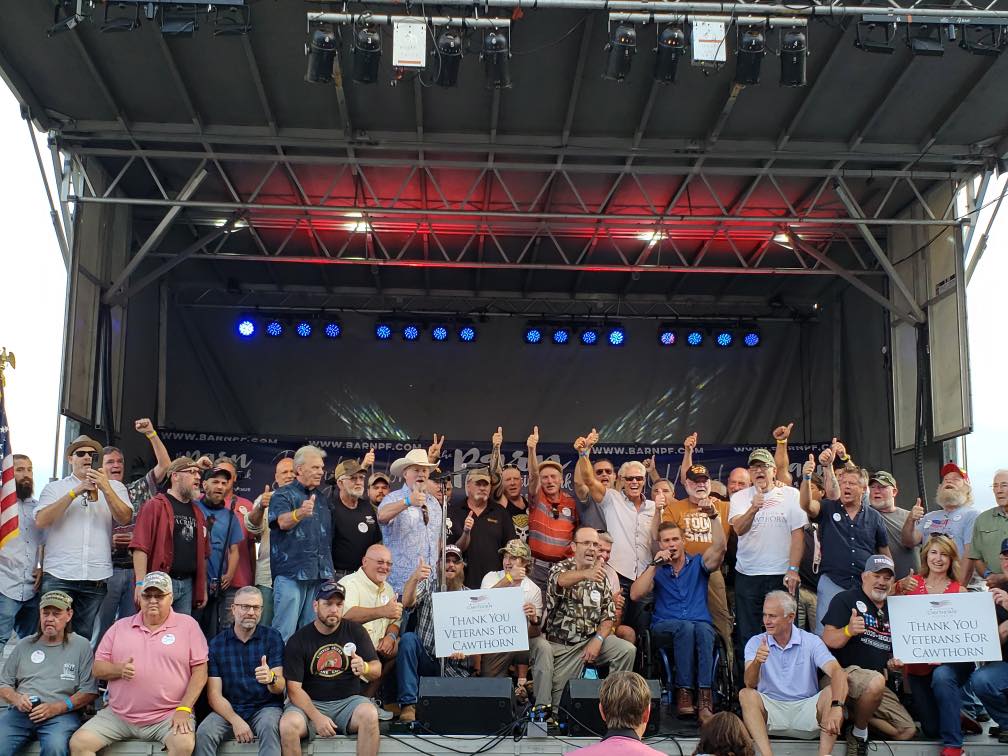The pope remains Catholic, bears defecate in the woods, and Democrats disagree with Republicans.
Candidates on different sides of the political aisle have long striven to outline different visions of governance on issues such as taxes, immigration and national defense. But in 2020, the COVID-19 pandemic has added a new wrinkle: The way in which those messages are being delivered to voters has itself become a point of partisan posture.
Many Republican candidates for local office have continued to build voter support through traditional in-person campaign events such as rallies and fundraising concerts. In contrast, Democrats have largely relied on virtual efforts such as phone banking or Zoom calls, eschewing big events out of concern they might encourage spread of the coronavirus.
For Rep. Brian Turner, a Democrat running for reelection in Buncombe County’s N.C. House District 116, the Republican approach to campaigning during COVID-19 signals a dangerous disregard for public health. On July 25, he took to Facebook to blast his opponent, Republican business owner Eric Burns, for holding an in-person campaign kickoff at Candler’s Hominy Valley Singing Grounds with well over 200 attendees.
“Families are wondering if their children and teachers will be safe at school this year. But my opponent is throwing himself [a] party. No social distancing. Not a mask in sight,” Turner wrote. “I need your help to make sure that I am able to go back to Raleigh and people like my opponent are never placed in a position of public trust. Lives depend on it.”
Public affairs
Republicans, however, have generally let their actions — and enthusiastic crowds, such as those observed during an Aug. 24 visit to Mills River by President Donald Trump — speak for their campaign choices. Burns initially agreed to answer questions from Xpress about his approach to the race but did not respond to multiple follow-up emails with specific queries, including one seeking a response to Turner’s remarks.
Turner also called out two Republican members of the Buncombe County Board of Commissioners, Joe Belcher and Robert Pressley, for attending the Burns event. Belcher is running for reelection in District 3 against Democratic candidate Parker Sloan, while Pressley is seeking to replace Democrat Brownie Newman as the board’s chair. Neither Republican responded to requests for comment. Neither did Jerry Green, chair of the Buncombe County Republican Party, who is responsible for the GOP’s overall approach to local elections.
In a recent conversation with Xpress, Turner stood by his social media post, which called Belcher’s and Pressley’s choice to attend the event “enraging and in my opinion disqualifying.” The Democrat pointed out that the crowd at Burns’ event exceeded the 25-person limit on outdoor mass gatherings in place at the time, as set by an executive order of Gov. Roy Cooper, by a factor of nearly 10: “That’s just completely irresponsible, and I think it shows a real lack of judgment and leadership,” he said.
But Chris Cooper, head of Western Carolina University’s political science department, suggests that some voters may not see it that way. “In the immediate political world, there’s no drawback — the people who choose to come to the events will clearly be more likely to support the candidates,” he says. “Democratic candidates forgoing these kinds of face-to-face moments are potentially sacrificing the most effective way to get their people to the polls.”
Face time
The only Republican contacted by Xpress who offered comment on campaigning was Madison Cawthorn, who is running against Democrat Moe Davis to represent North Carolina’s 11th Congressional District. On Aug. 30, Cawthorn hosted a fundraising concert by country musician Darryl Worley at Point Lookout Vineyards in Hendersonville; Skyline News reported that over 1,000 people attended, and a photo posted by the campaign’s Facebook page shows the maskless candidate posed with a tightly packed group of smiling, older veterans.
In response to a list of detailed questions, Cawthorn campaign spokesperson Micah Bock provided the following statement: “Madison Cawthorn believes that COVID-19 is no hoax and that all residents of NC-11 ought to take the precautions that they believe are necessary in order to remain healthy.
“He encourages every single one of his followers and people in the country that, ‘If you need to wear a mask, if you are in that area of your life where you may have a preexisting condition or you’re at an age where COVID-19 will greatly affect you, I encourage you, please practice social distancing, please wear a mask and if I’m around you, I will wear a mask myself.’ Madison firmly believes that each person ought to make an individual risk assessment and take the necessary precautions to protect themselves.”
That statement quotes Cawthorn’s response to a question about COVID-19 during a Sept. 4 debate, which an AVL Watchdog fact-checker found to be “misleading” and not aligned with guidance from the federal Centers for Disease Control and Prevention. Meanwhile, Davis tweeted on Aug. 30 that the Point Lookout concert was “another COVID-19 superspreader fundraising event” and suggested Cawthorn was “putting lives at risk to fundraise.”
The Davis campaign echoed those remarks when contacted for further comment. “Col. Davis has attended outdoor protests and events where there wasn’t always social distancing but has almost always worn a mask in those settings. Of course, that’s quite different from actually organizing an event that deliberately ignores guidelines for safety and puts the people invited at risk,” wrote campaign spokesperson Viv Bernstein.
Chris Cooper says Cawthorn and other Republican candidates who hold in-person events should expect to be on the receiving end of similar rhetoric as the campaign continues. “The downside of folks who are holding these rallies is the message they’re sending to swing voters and unaffiliated voters who may be concerned about coronavirus,” he explains. “Simply put, it’s giving Democrats an easy talking point that will reinforce the party’s positions on the pandemic.”
Freedom to assemble
Despite Democratic criticism, say local health officials, Republicans aren’t violating any state or county executive orders by holding in-person gatherings. Similar to street protests against stay-home restrictions and racial injustice that have taken place during the pandemic, campaign events are considered to be an exercise of First Amendment rights, a category specifically exempted from COVID-19 restrictions.
Although Gov. Cooper’s order “strongly urges” people engaging in First Amendment activities to avoid holding mass gatherings, practice social distancing and wear face coverings, they aren’t required to follow those guidelines, as are restaurants or retail businesses. Steve Smith, Henderson County’s health director, says he thus has no plans to take action against the Cawthorn campaign or Point Lookout Vineyards for the Aug. 30 fundraising concert.
“Our county attorney stipulated that campaigning pretty clearly fits among the rights protected by the First Amendment as applied to the states by the Fourteenth and Fifteenth Amendments and exempted from the executive orders — freedoms of religion/speech/press/peaceable assemblies/petition government,” Smith explained. “I cannot conceive of an interpretation of Gov. Cooper’s orders which would see campaigning for political office as not fitting under the exemption.”
Asked if Henderson County considered political events to be less risky than comparable nonpolitical events, Smith responded that transmission of COVID-19 at any event depended on “compliance among attendees with basic preventive measures.” He added that the county judges the relative danger of events according to CDC guidelines, which flag “large in-person gatherings where it is difficult for individuals to remain spaced at least 6 feet apart and attendees travel from outside the local area” — all descriptors matching the Cawthorn concert, per Skyline News reporting — as the highest risk.
Fletcher Tove, Buncombe County’s emergency preparedness director, echoed Smith’s interpretation of campaign activities in response to an Xpress query during a Sept. 3 press conference. “We’ve had this discussion,” he said. “They fall under the First Amendment freedom of speech or assembly. That’s the logic behind allowing them to exceed mass gathering guidance.”
See you next time?

But during a public health crisis, argues Turner, candidates should be guided by what they should do, rather than by what they can do. “There has to be a pretty sizable benefit for me to want to do something in person, even within the limits of what’s allowed,” he says, noting that his campaign hasn’t held an in-person event since March. “I don’t want to put people at risk if I don’t have to. I would feel really bad if I had an event and someone got sick because of it.”
Even informal conversations with voters out in the community have changed due to COVID-19, Turner adds. He’s asked constituents he encounters shopping at the supermarket to talk with him outside where there’s better ventilation, for example, while his usual chats over breakfast at The Miami Restaurant in Candler have turned into quick exchanges in the parking lot as he grabs takeout.
Rich Lee, a Democrat running in the nonpartisan race for Asheville City Council, has tried to move some of those conversations online through a series of Zoom calls on hot-button issues such as policing and reparations for the city’s Black residents. He says those virtual events have given him some perspective on the community’s attitudes but admits they can’t fully replace the breadth of experiences he’d hear through in-person campaigning.
And Chris Cooper says Lee and other Democrats may also be missing out on critical financial support when they stay behind a computer screen. “We know that face time is what can convince donors to contribute to campaigns. Much like buying a car, donors may want to kick the proverbial tires before making a purchase,” he notes.
Buncombe County Democratic Party Chair Jeff Rose agrees that the virtual approach leaves much to be desired. “One thing we are all missing out on this year are the conversations that happen on the sidelines of events,” he explains. “Having everyone together in a room for a meeting leads to a lot more work getting done than just what’s on the agenda, so we’re having to meet more regularly virtually to get our work done.”
Despite the challenges, Rose says his party remains committed to community safety and will continue to respect health guidance on COVID-19 precautions. Those limits were recently relaxed with North Carolina’s Sept. 4 move to Phase 2.5 of reopening, which allows mass gatherings of up to 25 people indoors and 50 outdoors.
In light of the governor’s signal, Lee says his campaign might start to hold some small, socially distanced in-person events such as a drop-in meet-and-greet on a brewery patio — a far cry, he emphasizes, from “a Madison Cawthorn-style concert.”
“It seems to me like they are almost doing those sorts of rallies as this performative, political, anti-mask stance,” Lee continues. “Maybe that benefits them among their constituencies, but it’s a thumb in the eye of everybody who’s been careful and tried to follow good science and keep the community safe to put people at risk as a statement.”




Before you comment
The comments section is here to provide a platform for civil dialogue on the issues we face together as a local community. Xpress is committed to offering this platform for all voices, but when the tone of the discussion gets nasty or strays off topic, we believe many people choose not to participate. Xpress editors are determined to moderate comments to ensure a constructive interchange is maintained. All comments judged not to be in keeping with the spirit of civil discourse will be removed and repeat violators will be banned. See here for our terms of service. Thank you for being part of this effort to promote respectful discussion.